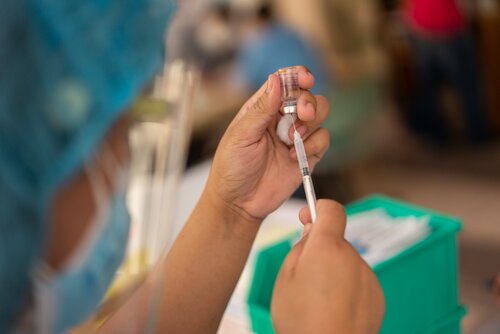UHC2030 hosted its annual UHC Day parliamentarian town hall to...
21 May 2021
Joint statement by UHC2030 Co-Chairs and the UHC Movement Political Advisory Panel

Around the world, no one is safe from COVID-19 until everyone is safe. Widening access to tests, treatments and vaccines is an international moral obligation and crucial to control the pandemic. But even this, alone, will not be enough. To end this crisis and build a safer and healthier future, the world must act urgently in three linked areas: equitable access to COVID-19 tools, preparedness for future emergencies, and universal health coverage.
To this end we call on global leaders to mobilise political will, commit additional financing and take collective action, and note several unprecedented opportunities.
First, the Access to COVID-19 Tools Accelerator (ACT-A) must be fully funded and must adequately prioritise health systems. We congratulate ACT-A partners on already supplying over 100 countries with life-saving vaccines. Donors and ACT-A partners should now ensure ACT-A fulfils crucial roles to both end the acute phase of the pandemic and help build health systems that protect everyone. The premise for the ACT-A Health Systems Connector is that vaccines only get into peoples’ arms if there are functioning supply chains, accessible health facilities, well-trained health workers, effective involvement of communities, and so on. The work of the Connector must be mindful of the impact vaccine rollout may have on other essential health services, and seize opportunities to strengthen health systems both now and for the future.
Second, we urge leaders to act on emergency preparedness, as recommended by the Independent Panel for Pandemic Preparedness and Response. COVID-19 was a preventable disaster. We strongly support the Panel’s call to “invest in preparedness now to create fully functional capacities at the national, regional and global level”. Coherent action is needed for better global governance, including strengthened international cooperation, and stronger country health systems. Pandemic preparedness and funding of global goods must be established as top international priorities, as part of an integrated health, social and economic agenda. Within countries, emergency preparedness must become an integral part of health planning at national, local and regional levels, and aligned with overall efforts to build resilient, equitable and accessible health systems, not as a separate silo.
Third, as we have argued throughout the pandemic, action on universal health coverage (UHC) commitments is more important than ever. The pandemic has reinforced why everyone, everywhere should have access to the health services they need, across the full range of public health, prevention and treatment. In 2019 the Political Declaration on UHC was lauded as the most ambitious and comprehensive declaration on health in history. Delivering on its commitments will help countries to recover from COVID-19 and prepare for future emergencies. In the words of the UN Secretary-General, “COVID-19 has shown that universal health coverage, strong public health systems and emergency preparedness are essential to communities, to economies, to everyone.” It is particularly important to accelerate progress towards gender equality, including through the Generation Equality Forum and Gender Equal Health and Care Workforce Initiative.
Now is the time for leaders to step up for this unified health agenda. To build on the Global Health Summit and Rome Declaration we join those calling for urgent agreement of a more robust international framework for cooperation on health. G7 and G20 meetings must secure political commitment and financial support for both stronger global governance and investment in stronger health systems. Member States must come together at the World Health Assembly and at UNGA and demonstrate their resolve.
Our concluding message to leaders is that strengthening both global governance and country health systems is a question of enlightened self-interest. COVID-19 has made clear that health is central to all countries’ economic and social goals and requires solidarity both within and between countries. Around the world, people have voiced that access to healthcare is their top priority for recovering from the pandemic. At the same time, the crisis has highlighted and exacerbated pre-existing inequalities, with marginalized and vulnerable groups and women and girls often suffering hardest. As leaders respond to the ongoing crisis and look to the future, now is the time to leave no one's health behind and invest in health systems for all.
UHC2030 Co-Chairs
Ms Gabriela Cuevas Barron
Dr Justin Koonin
UHC Movement Political Advisory Panel
Mr. Elhadj As Sy, Chair of the Board, Kofi Annan Foundation
Ms. Emilia Saiz, Secretary-General of the United Cities and Local Governments
Prof. Keizo Takemi, Member of the House of Councillors, Japan
Ms. María Fernanda Espinosa Garcés, President of the 73rd Session of the UN General Assembly
Dr. Vytenis Povilas Andriukaitis, Former European Commissioner for Health and Food Safety
More UHC2030 News
A global health financing emergency threatens progress toward...
UHC2030 at HSR2024: Advancing equity and inclusion in health systems through civil society knowledge
UHC2030, in collaboration with the SUPPORT-SYSTEMS research...
